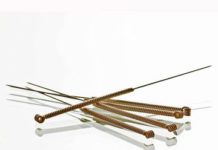
If you're looking to start a family at some point, you and your partner may be looking into freezing sperm.
"Sperm banking is the best insurance against infertility and offers couples the option of having their own biological baby," says Ashok Agarwal, Ph.D., urologist and head of the Andrology Laboratory at Cleveland Clinic's Fertility Center.
But getting the facts about what it's like to freeze your sperm and sperm banking can be elusive. We asked two fertility experts about some of the most frequently asked questions about what it is like to freeze your sperm and use a sperm bank.
Why do men bank their sperm?
Men can bank their sperm for a variety of reasons.
"Sperm banking is recommended for all men who are interested in future fertility," says Dr. Agarwal. "Most common are diagnosis of cancer such as testicular and Non-Hodgkin's disease, and prostate cancer."
Cancer treatment causes a decline in sperm quality, and many times may also result in sterility.
"Other reasons include men undergoing vasectomy, travel, men serving in the military, and those opting for gender reassignment can also benefit from sperm banking," says Dr. Agarwal.
Men with low sperm count are also encouraged to bank their sperm.
"Irrespective of the number and quality of their sperm, they should bank their specimen," says Dr. Agarwal. "The availability of even a few sperm is adequate for procreation using assisted reproductive techniques such as injecting a single sperm in the egg by an advanced technique called Intracytoplasmic sperm injection or ICSI."
And this includes before IVF treatments.
"Men with very low sperm counts may be encouraged to freeze sperm before IVF, in case their fresh ejaculate has no sperm in it on the day of their partner's egg retrieval," says Paula Brady, MD, reproductive endocrinologist and infertility specialist at NewYork-Presbyterian/Columbia University Irving Medical Center. "Surgically extracted sperm is usually frozen for use in future assisted reproductive treatments."
And men who plan to become fathers over 50 should also consider banking their sperm.
"Paternal age over 50 is associated with increased risk of autism and psychiatric disease such as schizophrenia in offspring, so men who anticipate delayed childbearing could consider banking sperm (though this is not a common request)," says Dr. Brady.
Where do you freeze your sperm?
A sperm bank, which sometimes is part of a fertility clinic.
However, there are home banking kits available as well for convenience and comfort.
"For those who are unable to come to the sperm bank, the option of providing a home sperm banking kit is available. The sample can be collected in the privacy of their home and shipped overnight to the laboratory for testing and freezing," says Dr. Agarwal.
And a new at-home sperm banking fertility kit called Dadi recently hit the market, that offers fertility testing and sperm banking options.
How does the process start to freeze sperm?
"Making the choice to bank sperm is intensely personal. If one is married or in a committed relationship, it is best that his partner is involved in the decision. If a male is under the age of 18, his parents should be included in the discussion. Sperm banking is done upon request of the physician only, and the physician recommends the need for sperm banking," says Dr. Agarwal.
From there, testing takes place.
"Men planning to bank sperm have blood work done to screen for sexually transmitted diseases, as well as a semen analysis to assess sperm parameters (count, motility and morphology/shape)," says Dr. Brady. "Men are usually encouraged to observe 2-3 days of abstinence (no ejaculations) before producing the sample for freezing, if possible."
Who are the ‘best candidates’ to freeze sperm?
"Anyone who is healthy and has some sperm in their ejaculate is a good candidate for sperm banking, says Dr. Agarwal.
And children also can bank sperm.
"Young children who have been diagnosed with cancer and have attained puberty are also good candidates for sperm banking," says Dr. Agarwal. "Everyone is encouraged to find information about sperm banking facilities, educate themselves and utilize this option, especially in situations where their fertility is threatened as in case of cancer and the treatment is urgent at a short notice.
If you want to be a sperm donor, there are also some guidelines.
"Those freezing for the purposes of sperm donation to commercial sperm banks should ideally be <40 years old, healthy, with excellent sperm parameters, and without family histories concerning for cancer or other hereditary disease," says Dr. Brady.
What men are not good candidates to freeze sperm?
"Men should ideally not bank sperm while getting chemotherapy, which often affects the DNA integrity of sperm and could result in birth defects or pregnancy loss," says Dr. Brady.
And men who have no sperm in their ejaculate are also not good candidates for sperm banking.
Are there any risks to men when freezing sperm?
"There are generally no risks to men in banking ejaculated sperm, other than cost," says Dr. Brady. "In men with extremely low sperm counts (rare sperm found per sample), no sperm may be found when a sample is thawed. Sperm is not thought to be damaged by freezing, and healthy babies have been born from sperm frozen for over a decade."
Adds Dr. Agarwal, "There are no increased risks of birth defects reported in men opting for sperm banking. Among thousands of children who have been conceived with frozen sperm, the incidence of birth defects has been no different than that among children conceived through sexual intercourse."
How much does it cost to freeze sperm?
This can vary depending on if sperm banking is covered by your health insurance.
"Sperm banking may be covered by insurance if it is being done for medical reasons," says Dr. Brady. "But in general, banking is usually not covered. It generally costs at least a few hundred dollars per sample frozen, in addition to annual storage fees that depend on the center."
Specifically, Dr. Agarwal offers some numbers.
"The charge for cryopreserving a single ejaculate is typically about $786. The storage fee for each specimen is $260 per year. The payment is based on the number of samples banked. Many private insurance carriers cover part or all of the costs of banking sperm, especially before cancer treatment."
What is the process like to provide a sperm sample at a sperm bank?
There's more that goes into it than just being handed a plastic retrieval cup. And first things first, it should be all about comfort.
"During the entire process of sperm banking, complete privacy is of utmost important. The patient may feel embarrassed to ask certain questions. The whole conversation takes place in a completely private and confidential, closed room setting," says Dr. Agarwal. "The patient is provided information in a very personal and professional manner designed to set the patient at ease. "
After making an appointment with a fertility specialist to collect, the first thing you'll do is paperwork.
"At the first visit, the patient will be asked to complete a questionnaire about their diagnosis and planned treatment, as well as a contract and other legal forms related to sperm banking," says Dr. Agarwal.
After that, it is time to collect.
"Semen specimens are collected in a private collection room. (It is recommended that sample are collected in a laboratory because the sample's freshness affects fertility. Within minutes after ejaculation, the number of living sperm cells and their activity begin to drop off rapidly.) Patients are given a sterile collection cup for their specimen," says Dr. Agarwal.
Then patients are instructed to collect.
"Manual stimulation to orgasm, either by the patient or with his wife or significant other, is the only recommended method in order to avoid contaminating the semen with bacteria," says Dr. Agarwal. "For each pregnancy that one may desire, he should bank between three and six specimens, depending on their quality."
Adds Dr. Brady, "If needed for personal or religious reasons, a patient's sample can be collected at home through masturbation or collection in a clinic-provided condom, using only clinic-approved lubricant as needed. Home-collected samples should be brought to the clinic ASAP (within 1 hour) for analysis."































